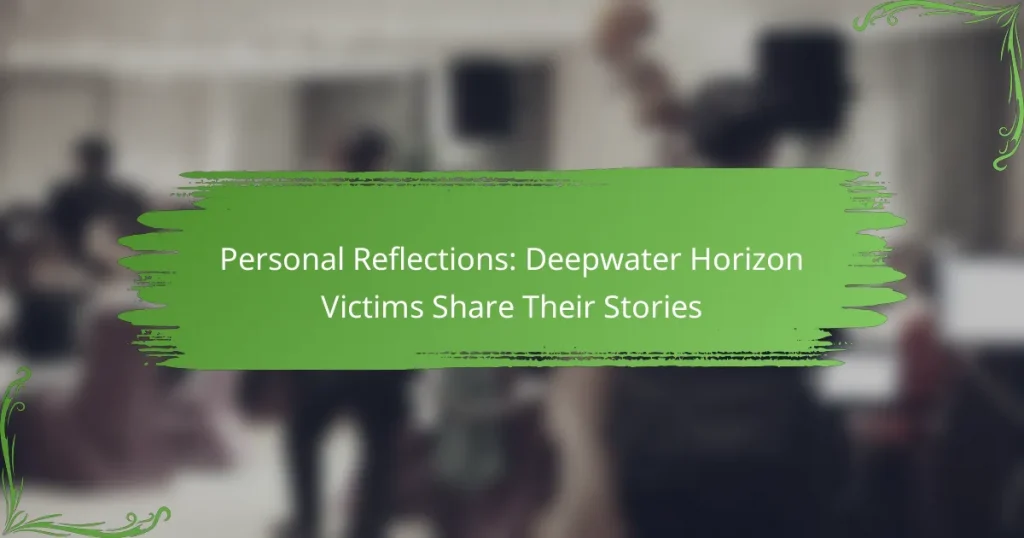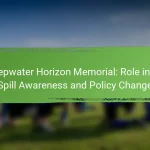The Deepwater Horizon disaster has had profound and lasting effects on its victims, encompassing emotional, psychological, and physical dimensions. Personal reflections from survivors reveal deep feelings of loss, trauma, and ongoing mental health challenges, including anxiety and depression. The disaster has disrupted livelihoods, particularly impacting the fishing and tourism industries in the Gulf Coast, resulting in significant economic hardship. Support systems, such as financial compensation and mental health services, are available to assist victims in coping with their circumstances. This article highlights the personal stories of those affected and underscores the need for improved safety regulations in the oil industry to prevent future tragedies.
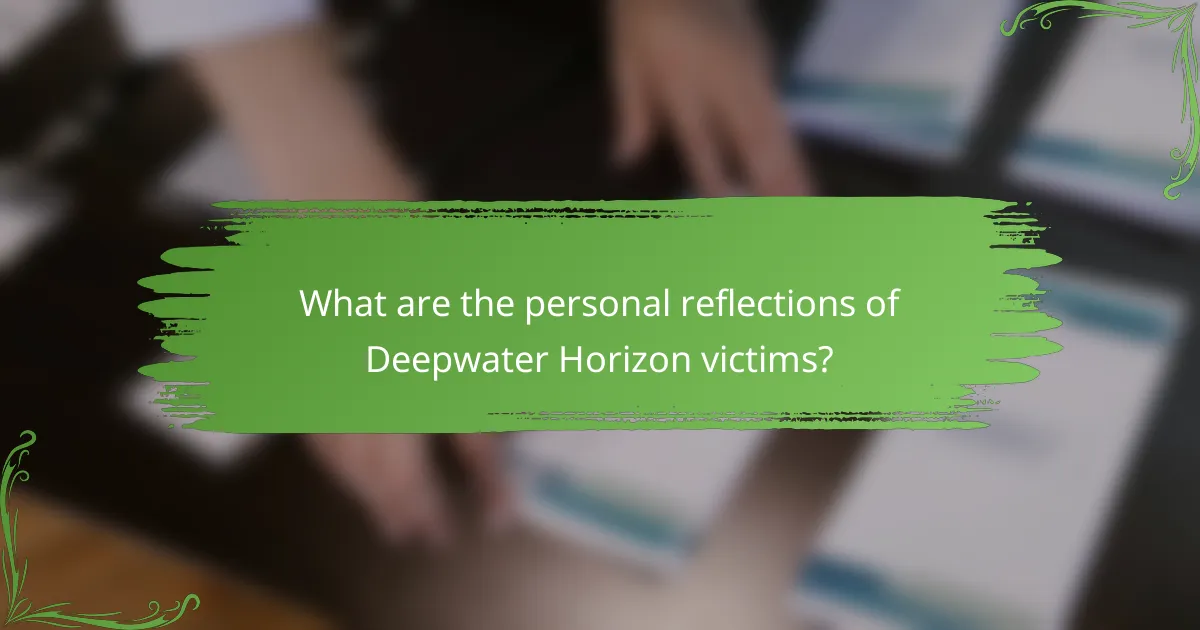
What are the personal reflections of Deepwater Horizon victims?
Personal reflections of Deepwater Horizon victims reveal deep emotional and psychological impacts. Many victims express feelings of loss and grief for loved ones affected by the disaster. Survivors recount the trauma of the event and its aftermath. They describe struggles with mental health issues such as anxiety and depression. Victims often reflect on the disruption to their livelihoods and communities. Several share stories of resilience and the desire for justice. Many emphasize the need for better safety regulations in the oil industry. These reflections highlight the long-term consequences of the tragedy on individuals and families.
How did the Deepwater Horizon disaster impact the lives of its victims?
The Deepwater Horizon disaster significantly impacted the lives of its victims. Many victims faced immediate physical injuries and psychological trauma. The explosion killed 11 workers, leaving families devastated. Survivors experienced long-term health issues due to exposure to toxic substances. Economic consequences included job loss for those employed on the rig and in related sectors. Local communities suffered from environmental degradation, affecting fishing and tourism industries. Compensation claims became a lengthy process, adding financial stress. Victims reported feelings of anger and helplessness in the aftermath. The disaster altered their sense of safety and trust in corporate practices.
What specific experiences do victims share about the event?
Victims of the Deepwater Horizon event share experiences of loss, trauma, and disruption. Many describe the immediate aftermath as chaotic and frightening. They recount feelings of helplessness as the oil spill affected their livelihoods. Fishermen lost income due to contaminated waters. Families faced health issues linked to exposure to toxic substances. Some victims report emotional distress and anxiety related to the disaster. Community bonds were strained as residents dealt with the fallout. Victims emphasize the long-term impact on their lives and the environment. Their stories highlight the need for accountability and support for affected individuals.
How have victims’ perspectives changed over time?
Victims’ perspectives have evolved significantly over time following the Deepwater Horizon disaster. Initially, many victims felt anger and frustration due to the immediate impact of the oil spill on their lives and livelihoods. As time progressed, some victims shifted their focus towards seeking justice and accountability from BP and other responsible parties. This change was influenced by ongoing legal battles and public awareness campaigns.
Additionally, victims began to emphasize the long-term environmental and health effects of the spill. Reports and studies highlighted these issues, prompting victims to advocate for better health monitoring and environmental protections. Over the years, community support networks have also formed, allowing victims to share their experiences and foster resilience.
The narrative has shifted from individual suffering to collective action for change. Victims now often participate in advocacy efforts, pushing for policy reforms that address the needs of affected communities. This evolution reflects a broader understanding of the disaster’s impact and a desire for proactive measures to prevent future incidents.
What emotions do victims express in their stories?
Victims express a range of emotions in their stories, including anger, sadness, and fear. Anger often arises from feelings of betrayal and loss. Many victims feel deep sadness over the impact on their lives and livelihoods. Fear is commonly expressed regarding the future and potential health consequences. Victims also share feelings of hopelessness and frustration with the recovery process. These emotions reflect the profound psychological toll of the Deepwater Horizon disaster. Research indicates that trauma from such events can lead to long-lasting emotional distress.
What feelings of loss or grief do victims articulate?
Victims articulate profound feelings of loss and grief related to their experiences. They often express sorrow over lost loved ones and the impact on their families. Many report a sense of emptiness and longing for normalcy that has been disrupted. Victims frequently mention feelings of anger and frustration towards the circumstances that caused their suffering. They also describe a loss of identity and purpose due to their traumatic experiences. The emotional toll includes anxiety and fear about the future. These sentiments are common among those affected by the Deepwater Horizon disaster.
How do victims describe their struggles with recovery?
Victims describe their struggles with recovery as overwhelming and multifaceted. They often express feelings of anxiety and depression during the healing process. Many report difficulty in returning to normalcy in their lives. Physical pain and emotional distress are common themes in their narratives. Victims frequently mention the impact of financial strain on their recovery efforts. They also highlight the importance of support systems in navigating their challenges. Some victims feel isolated due to their experiences, which exacerbates their struggles. Overall, their accounts reveal a complex interplay of emotional, physical, and social hurdles in recovery.
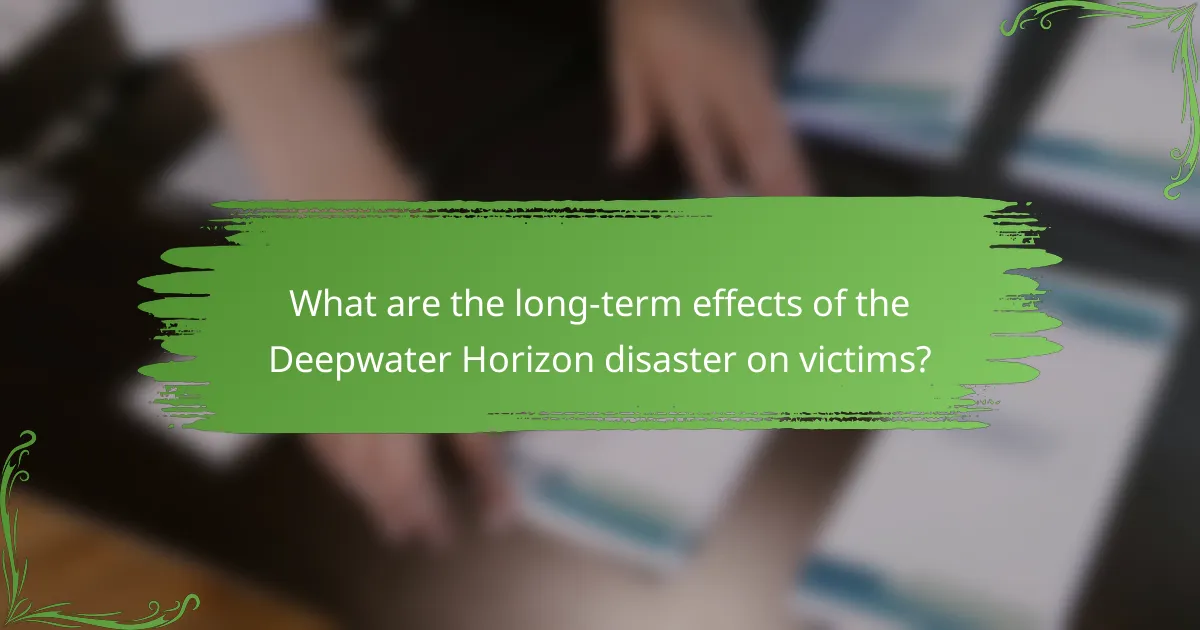
What are the long-term effects of the Deepwater Horizon disaster on victims?
The long-term effects of the Deepwater Horizon disaster on victims include chronic health issues, economic hardship, and psychological trauma. Many victims report respiratory problems due to exposure to toxic fumes. Additionally, skin conditions and other illnesses have emerged among affected individuals. Economic impacts are significant, with many losing jobs or facing reduced income. The fishing and tourism industries in the Gulf Coast have been severely affected. Victims also experience mental health challenges, including anxiety and depression. Studies indicate that these psychological effects persist long after the incident. Overall, the disaster has led to lasting physical, economic, and emotional consequences for many individuals.
How has the disaster affected victims’ mental health?
The disaster has significantly impacted victims’ mental health. Many victims experience anxiety and depression as a direct result of the traumatic events. Research indicates that post-traumatic stress disorder (PTSD) is prevalent among those affected. A study published in the American Journal of Public Health found that 25% of individuals reported symptoms consistent with PTSD after the disaster. Victims also face increased feelings of hopelessness and social isolation. The disruption of their livelihoods contributes to ongoing stress and uncertainty. Long-term mental health support is essential for recovery. Access to mental health resources remains a critical need for affected individuals.
What psychological challenges do victims report facing?
Victims report facing various psychological challenges, including anxiety, depression, and post-traumatic stress disorder (PTSD). Many experience intrusive thoughts and flashbacks related to the traumatic event. Emotional numbness and difficulty in trusting others are also common. Victims may struggle with feelings of isolation and helplessness. Research indicates that around 30% of disaster survivors develop PTSD. This statistic highlights the significant mental health impact of such traumatic experiences. Additionally, victims often report challenges in resuming normal daily activities and relationships. These psychological issues can persist long after the initial event, affecting overall quality of life.
How do victims cope with trauma related to the disaster?
Victims cope with trauma related to the disaster through various strategies. Common methods include seeking psychological support, engaging in community activities, and practicing self-care. Many victims find therapy beneficial, as it provides a safe space to process emotions. Support groups also offer shared experiences, fostering a sense of belonging. Additionally, some individuals turn to creative outlets like art or writing to express their feelings. Physical activities, such as exercise, help reduce stress and improve mental health. Mindfulness techniques, including meditation, can aid in managing anxiety. Research indicates that these coping mechanisms can significantly enhance resilience in trauma survivors.
What physical consequences have victims experienced?
Victims of the Deepwater Horizon disaster have experienced various physical consequences. Many have reported respiratory issues due to exposure to toxic fumes. Skin irritations and rashes were common among those who came into contact with contaminated water. Some victims have suffered from gastrointestinal problems linked to exposure to oil and dispersants. Neurological symptoms, including headaches and dizziness, have also been reported. In severe cases, long-term health effects may include chronic conditions such as asthma or other respiratory diseases. Studies have shown increased rates of these health issues among cleanup workers and local residents. Research from the National Institute for Environmental Health Sciences highlights these health impacts.
What health issues have been linked to the disaster?
The Deepwater Horizon disaster has been linked to various health issues among affected individuals. Respiratory problems are common due to exposure to toxic fumes and chemicals. Skin conditions have also been reported, resulting from contact with contaminated water. Mental health issues, including anxiety and depression, have increased among those impacted by the disaster. Gastrointestinal disorders have been observed, likely connected to the ingestion of polluted seafood. Studies indicate that these health problems are a direct consequence of the environmental contamination caused by the oil spill. For instance, the Centers for Disease Control and Prevention (CDC) noted that residents near the spill site experienced higher rates of respiratory ailments.
How do victims navigate their physical recovery journeys?
Victims navigate their physical recovery journeys through structured rehabilitation programs. These programs often include physical therapy to regain strength and mobility. Victims also rely on support groups for emotional and psychological assistance. Regular medical check-ups help monitor progress and adjust treatment plans. Many utilize adaptive equipment to aid daily activities. Personal determination plays a crucial role in overcoming challenges. Studies show that social support enhances recovery outcomes. Victims often share their experiences to inspire others facing similar struggles.
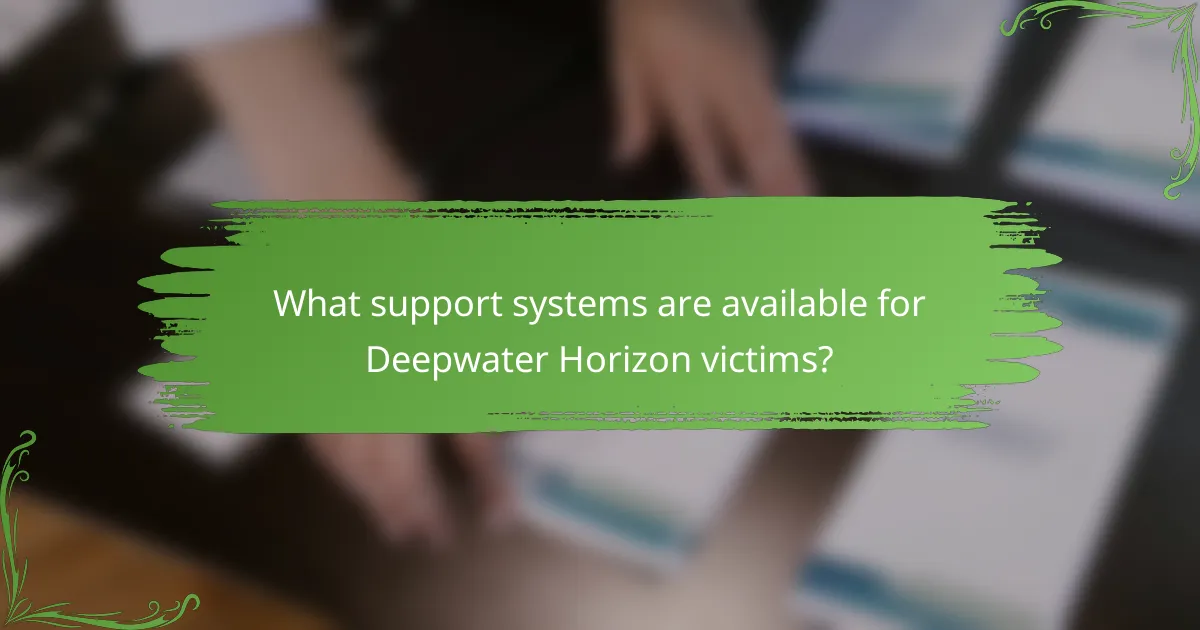
What support systems are available for Deepwater Horizon victims?
Support systems available for Deepwater Horizon victims include financial compensation, legal assistance, and mental health services. The Deepwater Horizon Claims Center was established to process claims for economic and property damage. Victims can receive compensation through the Oil Pollution Act and the BP Settlement Fund. Legal assistance is provided by various nonprofits and law firms specializing in environmental and personal injury law. Mental health services are available through community organizations and hotlines. These support systems aim to address the immediate and long-term needs of affected individuals and families.
How do community resources assist victims in their recovery?
Community resources assist victims in their recovery by providing essential support services. These services include counseling, financial aid, and legal assistance. Victims can access mental health support to cope with trauma. Financial resources help cover medical bills and living expenses. Legal aid assists victims in navigating claims processes. Community organizations often offer workshops and support groups. These gatherings foster connection and shared experiences among victims. Research shows that social support significantly enhances recovery outcomes for trauma survivors.
What types of support groups exist for victims?
Support groups for victims include peer support groups, therapy groups, and online support communities. Peer support groups allow victims to share experiences and provide emotional support. Therapy groups are facilitated by professionals, focusing on healing and coping strategies. Online support communities offer anonymity and accessibility for those who may not attend in-person meetings. Each type of group fosters a sense of belonging and understanding among participants. These groups have been shown to improve mental health outcomes for victims, aiding in recovery and resilience.
How effective are these support systems in helping victims heal?
Support systems are highly effective in helping victims heal. They provide emotional support, practical assistance, and resources for recovery. Studies indicate that victims who engage with support systems report higher levels of psychological well-being. For instance, a report by the National Center for PTSD shows that peer support groups significantly reduce symptoms of trauma. Additionally, access to mental health services through these systems leads to improved coping strategies. Victims often feel less isolated when connected to others who share similar experiences. Overall, these systems play a crucial role in the healing process for victims.
What role do personal narratives play in advocacy and awareness?
Personal narratives play a crucial role in advocacy and awareness by humanizing issues and fostering empathy. They provide firsthand accounts that illustrate the impact of events, such as the Deepwater Horizon oil spill. These stories can evoke emotional responses, prompting individuals to engage with the topic more deeply. Research shows that narratives can be more persuasive than statistics alone. They help to create a connection between the audience and the advocates. This connection can mobilize support for causes and drive social change. For example, survivors of the Deepwater Horizon disaster have shared their experiences to highlight environmental and economic devastation. Their narratives have raised awareness and influenced policy discussions.
How can sharing stories impact public perception of the disaster?
Sharing stories can significantly influence public perception of a disaster. Personal narratives humanize the event and evoke empathy. They provide relatable experiences that statistics alone cannot convey. This emotional connection can shift public attitudes and increase awareness. For example, the Deepwater Horizon disaster led to numerous personal accounts that highlighted individual suffering and loss. These stories often garnered media attention, amplifying their reach. Research shows that storytelling can enhance community support and mobilize action. A study by the American Psychological Association found that narratives can alter perceptions and drive engagement in social issues. Thus, sharing stories is a powerful tool for shaping how the public views disasters.
What actions have victims taken to raise awareness about their experiences?
Victims of the Deepwater Horizon disaster have taken various actions to raise awareness about their experiences. They have shared personal testimonies through media interviews and public speaking events. Many have participated in documentaries highlighting the impact of the disaster on their lives. Victims have also engaged in social media campaigns to reach a broader audience. Some have formed support groups to connect with others affected and amplify their voices. Additionally, they have collaborated with advocacy organizations to push for policy changes. These actions aim to inform the public and hold responsible parties accountable. By sharing their stories, victims seek to prevent future disasters and promote environmental justice.
What practical advice can be offered to Deepwater Horizon victims?
Deepwater Horizon victims should seek legal assistance to navigate claims for compensation. Engaging with attorneys experienced in oil spill litigation can help victims understand their rights. They should document all damages, including health issues and property loss. Collecting evidence is crucial for supporting claims. Victims should also connect with support groups for emotional and psychological assistance. These groups provide resources and a sense of community. Additionally, staying informed about ongoing legal proceedings can help victims make informed decisions. Seeking medical evaluations for any health impacts is essential for long-term care.
What steps can victims take to seek emotional support?
Victims can seek emotional support by reaching out to mental health professionals. This includes therapists, counselors, or psychologists who specialize in trauma. They can also join support groups for individuals with similar experiences. Sharing feelings in a safe environment can promote healing. Additionally, victims can talk to trusted friends or family members for emotional support. Engaging in community activities can help build connections. Practicing self-care techniques, such as mindfulness or journaling, can also be beneficial. Studies show that social support significantly improves mental health outcomes after traumatic events.
How can victims access medical and psychological resources effectively?
Victims can access medical and psychological resources effectively by utilizing local health services and support organizations. Many communities have dedicated hotlines for immediate assistance. Victims should also reach out to healthcare providers who specialize in trauma care. Research indicates that early intervention improves recovery outcomes. Furthermore, local non-profits often offer counseling services tailored to specific incidents like the Deepwater Horizon disaster. Online resources, such as mental health websites, can provide valuable information and referrals. Local health departments may also have programs specifically designed for disaster victims. Accessing these resources promptly can significantly aid in recovery.
The main entity of the article is the personal reflections of Deepwater Horizon victims. The article explores the emotional and psychological impacts of the disaster on individuals and families, detailing their experiences of loss, trauma, and disruption. It highlights the long-term effects, including health issues, economic hardship, and mental health challenges, while emphasizing the importance of support systems and community resources. Victims’ evolving perspectives on justice and advocacy are also discussed, showcasing their resilience and efforts to raise awareness about the disaster’s consequences.
